Factors that enable nurses to learn in the clinical setting
VerifiedAdded on 2022/12/14
|8
|2315
|186
AI Summary
This essay discusses the factors that enable nursing professionals to learn in clinical settings, including debriefing, experiential learning theory, simulation, and communities of practice.
Contribute Materials
Your contribution can guide someone’s learning journey. Share your
documents today.
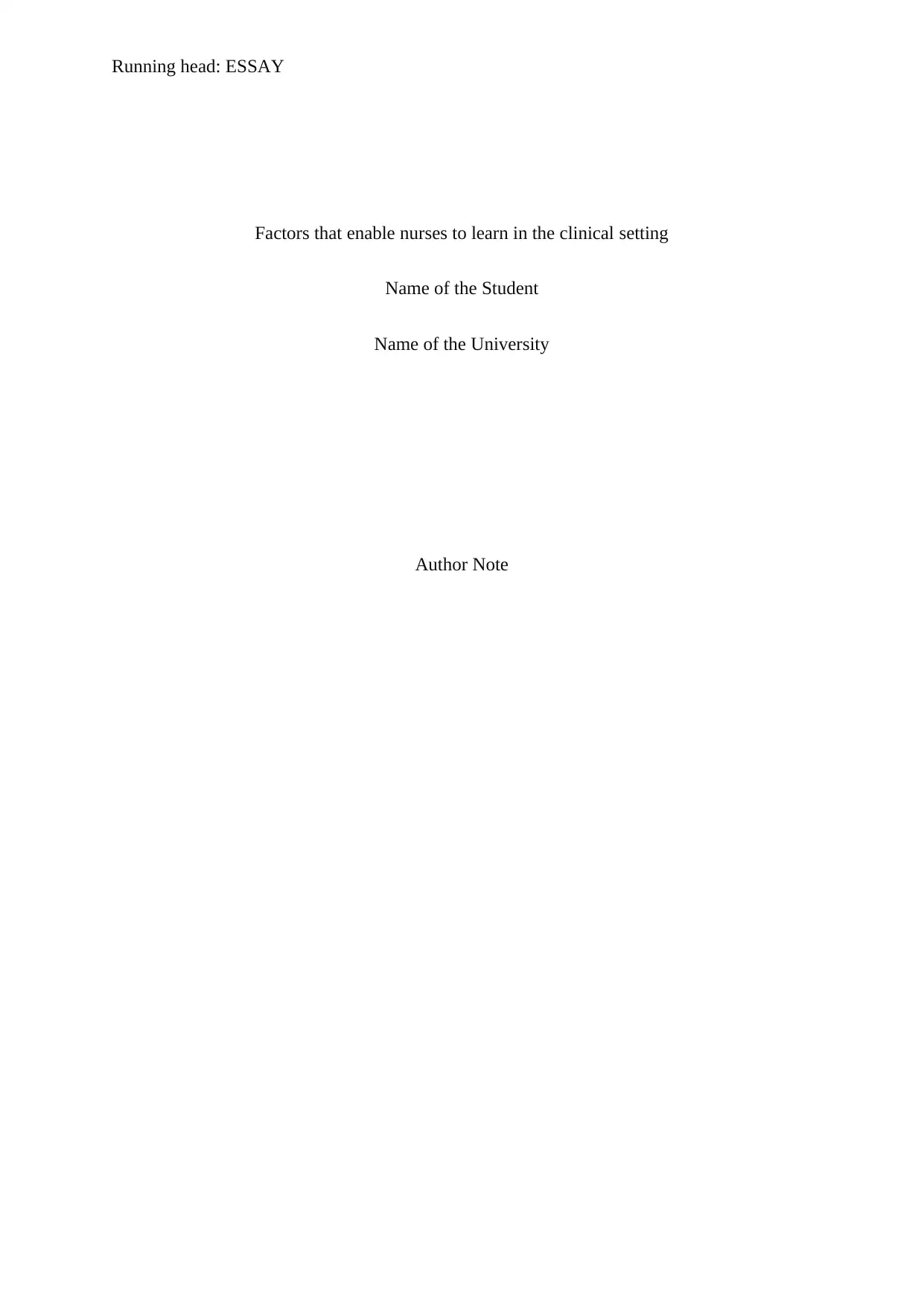
Running head: ESSAY
Factors that enable nurses to learn in the clinical setting
Name of the Student
Name of the University
Author Note
Factors that enable nurses to learn in the clinical setting
Name of the Student
Name of the University
Author Note
Secure Best Marks with AI Grader
Need help grading? Try our AI Grader for instant feedback on your assignments.
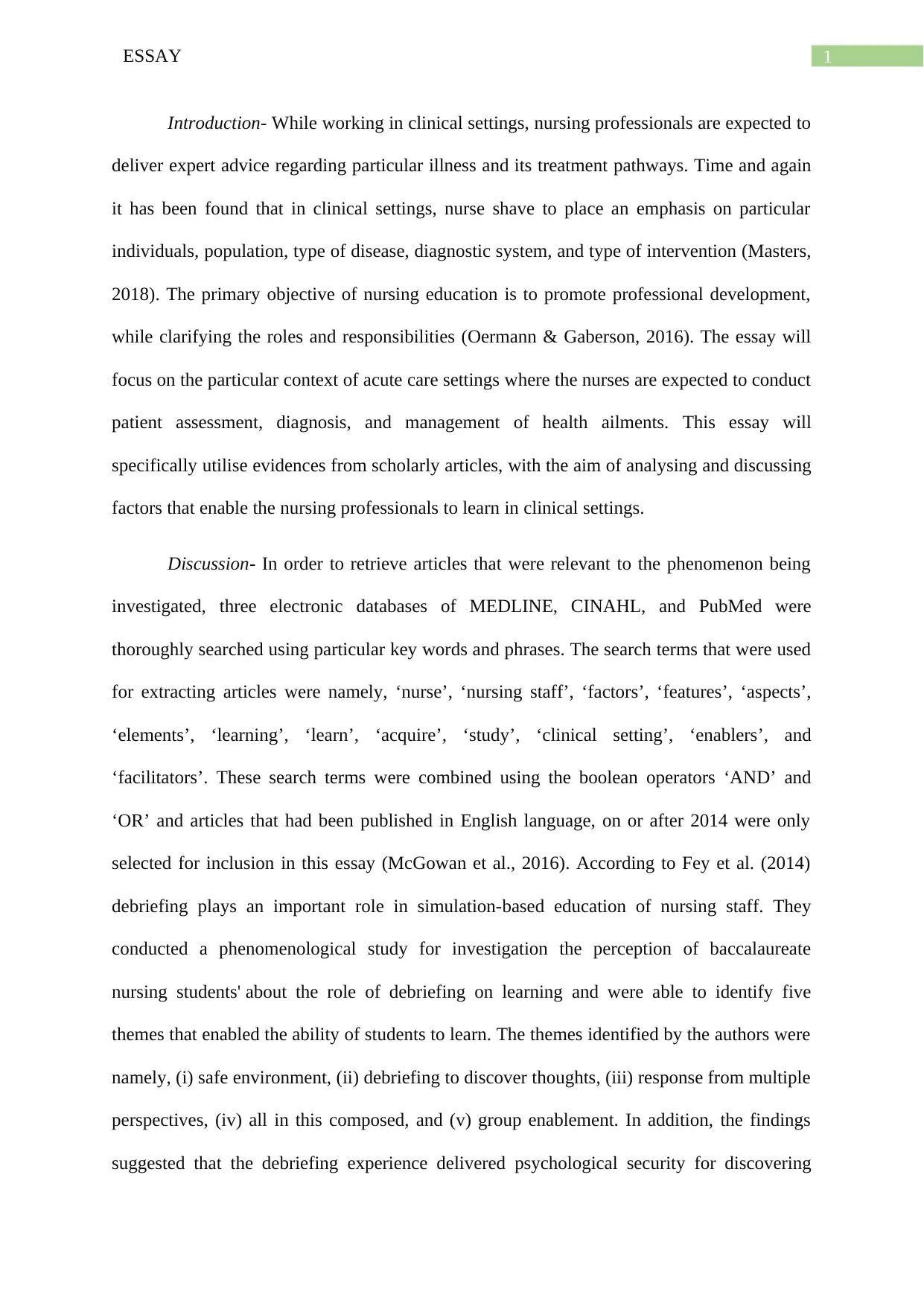
1ESSAY
Introduction- While working in clinical settings, nursing professionals are expected to
deliver expert advice regarding particular illness and its treatment pathways. Time and again
it has been found that in clinical settings, nurse shave to place an emphasis on particular
individuals, population, type of disease, diagnostic system, and type of intervention (Masters,
2018). The primary objective of nursing education is to promote professional development,
while clarifying the roles and responsibilities (Oermann & Gaberson, 2016). The essay will
focus on the particular context of acute care settings where the nurses are expected to conduct
patient assessment, diagnosis, and management of health ailments. This essay will
specifically utilise evidences from scholarly articles, with the aim of analysing and discussing
factors that enable the nursing professionals to learn in clinical settings.
Discussion- In order to retrieve articles that were relevant to the phenomenon being
investigated, three electronic databases of MEDLINE, CINAHL, and PubMed were
thoroughly searched using particular key words and phrases. The search terms that were used
for extracting articles were namely, ‘nurse’, ‘nursing staff’, ‘factors’, ‘features’, ‘aspects’,
‘elements’, ‘learning’, ‘learn’, ‘acquire’, ‘study’, ‘clinical setting’, ‘enablers’, and
‘facilitators’. These search terms were combined using the boolean operators ‘AND’ and
‘OR’ and articles that had been published in English language, on or after 2014 were only
selected for inclusion in this essay (McGowan et al., 2016). According to Fey et al. (2014)
debriefing plays an important role in simulation-based education of nursing staff. They
conducted a phenomenological study for investigation the perception of baccalaureate
nursing students' about the role of debriefing on learning and were able to identify five
themes that enabled the ability of students to learn. The themes identified by the authors were
namely, (i) safe environment, (ii) debriefing to discover thoughts, (iii) response from multiple
perspectives, (iv) all in this composed, and (v) group enablement. In addition, the findings
suggested that the debriefing experience delivered psychological security for discovering
Introduction- While working in clinical settings, nursing professionals are expected to
deliver expert advice regarding particular illness and its treatment pathways. Time and again
it has been found that in clinical settings, nurse shave to place an emphasis on particular
individuals, population, type of disease, diagnostic system, and type of intervention (Masters,
2018). The primary objective of nursing education is to promote professional development,
while clarifying the roles and responsibilities (Oermann & Gaberson, 2016). The essay will
focus on the particular context of acute care settings where the nurses are expected to conduct
patient assessment, diagnosis, and management of health ailments. This essay will
specifically utilise evidences from scholarly articles, with the aim of analysing and discussing
factors that enable the nursing professionals to learn in clinical settings.
Discussion- In order to retrieve articles that were relevant to the phenomenon being
investigated, three electronic databases of MEDLINE, CINAHL, and PubMed were
thoroughly searched using particular key words and phrases. The search terms that were used
for extracting articles were namely, ‘nurse’, ‘nursing staff’, ‘factors’, ‘features’, ‘aspects’,
‘elements’, ‘learning’, ‘learn’, ‘acquire’, ‘study’, ‘clinical setting’, ‘enablers’, and
‘facilitators’. These search terms were combined using the boolean operators ‘AND’ and
‘OR’ and articles that had been published in English language, on or after 2014 were only
selected for inclusion in this essay (McGowan et al., 2016). According to Fey et al. (2014)
debriefing plays an important role in simulation-based education of nursing staff. They
conducted a phenomenological study for investigation the perception of baccalaureate
nursing students' about the role of debriefing on learning and were able to identify five
themes that enabled the ability of students to learn. The themes identified by the authors were
namely, (i) safe environment, (ii) debriefing to discover thoughts, (iii) response from multiple
perspectives, (iv) all in this composed, and (v) group enablement. In addition, the findings
suggested that the debriefing experience delivered psychological security for discovering
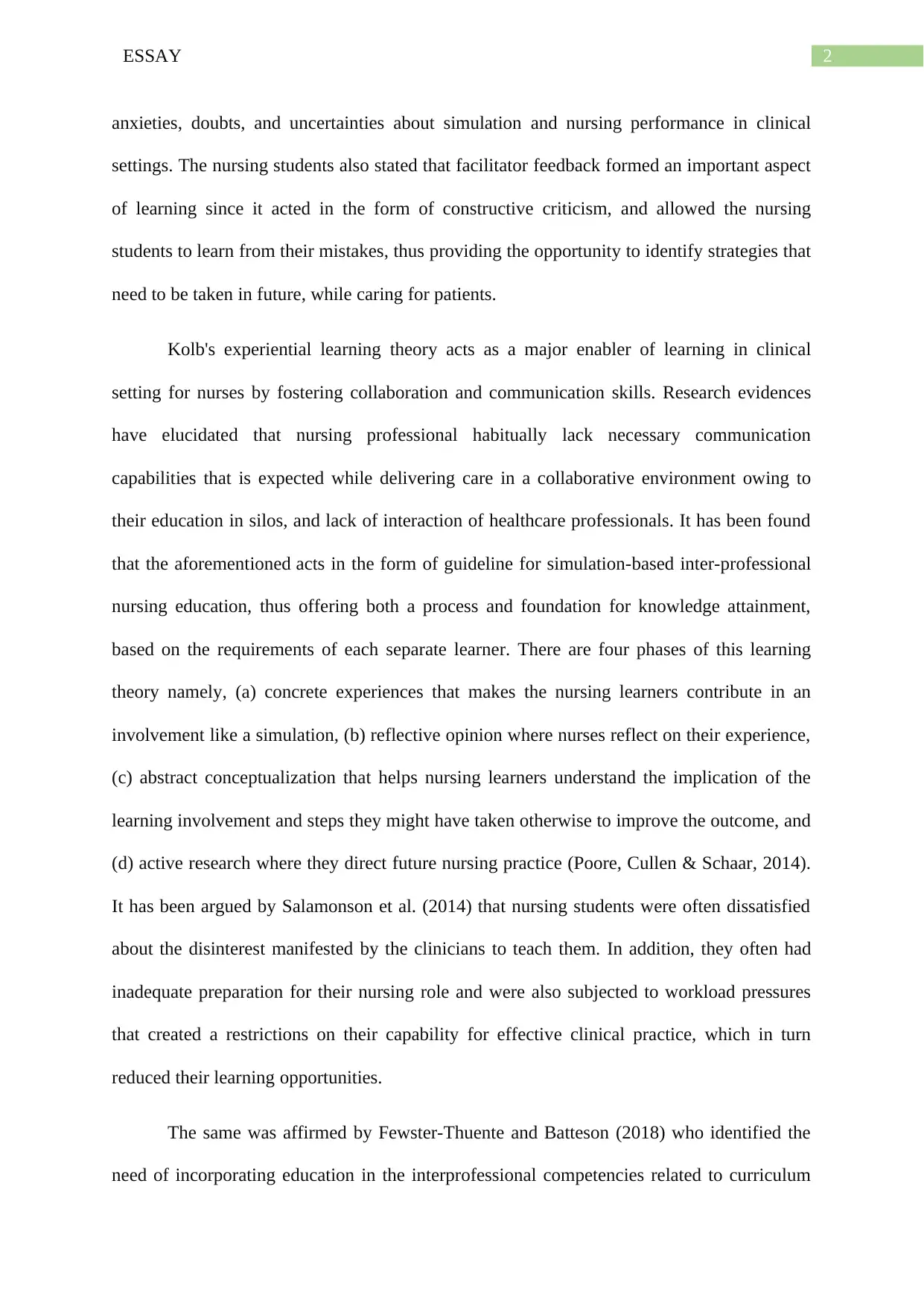
2ESSAY
anxieties, doubts, and uncertainties about simulation and nursing performance in clinical
settings. The nursing students also stated that facilitator feedback formed an important aspect
of learning since it acted in the form of constructive criticism, and allowed the nursing
students to learn from their mistakes, thus providing the opportunity to identify strategies that
need to be taken in future, while caring for patients.
Kolb's experiential learning theory acts as a major enabler of learning in clinical
setting for nurses by fostering collaboration and communication skills. Research evidences
have elucidated that nursing professional habitually lack necessary communication
capabilities that is expected while delivering care in a collaborative environment owing to
their education in silos, and lack of interaction of healthcare professionals. It has been found
that the aforementioned acts in the form of guideline for simulation-based inter-professional
nursing education, thus offering both a process and foundation for knowledge attainment,
based on the requirements of each separate learner. There are four phases of this learning
theory namely, (a) concrete experiences that makes the nursing learners contribute in an
involvement like a simulation, (b) reflective opinion where nurses reflect on their experience,
(c) abstract conceptualization that helps nursing learners understand the implication of the
learning involvement and steps they might have taken otherwise to improve the outcome, and
(d) active research where they direct future nursing practice (Poore, Cullen & Schaar, 2014).
It has been argued by Salamonson et al. (2014) that nursing students were often dissatisfied
about the disinterest manifested by the clinicians to teach them. In addition, they often had
inadequate preparation for their nursing role and were also subjected to workload pressures
that created a restrictions on their capability for effective clinical practice, which in turn
reduced their learning opportunities.
The same was affirmed by Fewster-Thuente and Batteson (2018) who identified the
need of incorporating education in the interprofessional competencies related to curriculum
anxieties, doubts, and uncertainties about simulation and nursing performance in clinical
settings. The nursing students also stated that facilitator feedback formed an important aspect
of learning since it acted in the form of constructive criticism, and allowed the nursing
students to learn from their mistakes, thus providing the opportunity to identify strategies that
need to be taken in future, while caring for patients.
Kolb's experiential learning theory acts as a major enabler of learning in clinical
setting for nurses by fostering collaboration and communication skills. Research evidences
have elucidated that nursing professional habitually lack necessary communication
capabilities that is expected while delivering care in a collaborative environment owing to
their education in silos, and lack of interaction of healthcare professionals. It has been found
that the aforementioned acts in the form of guideline for simulation-based inter-professional
nursing education, thus offering both a process and foundation for knowledge attainment,
based on the requirements of each separate learner. There are four phases of this learning
theory namely, (a) concrete experiences that makes the nursing learners contribute in an
involvement like a simulation, (b) reflective opinion where nurses reflect on their experience,
(c) abstract conceptualization that helps nursing learners understand the implication of the
learning involvement and steps they might have taken otherwise to improve the outcome, and
(d) active research where they direct future nursing practice (Poore, Cullen & Schaar, 2014).
It has been argued by Salamonson et al. (2014) that nursing students were often dissatisfied
about the disinterest manifested by the clinicians to teach them. In addition, they often had
inadequate preparation for their nursing role and were also subjected to workload pressures
that created a restrictions on their capability for effective clinical practice, which in turn
reduced their learning opportunities.
The same was affirmed by Fewster-Thuente and Batteson (2018) who identified the
need of incorporating education in the interprofessional competencies related to curriculum
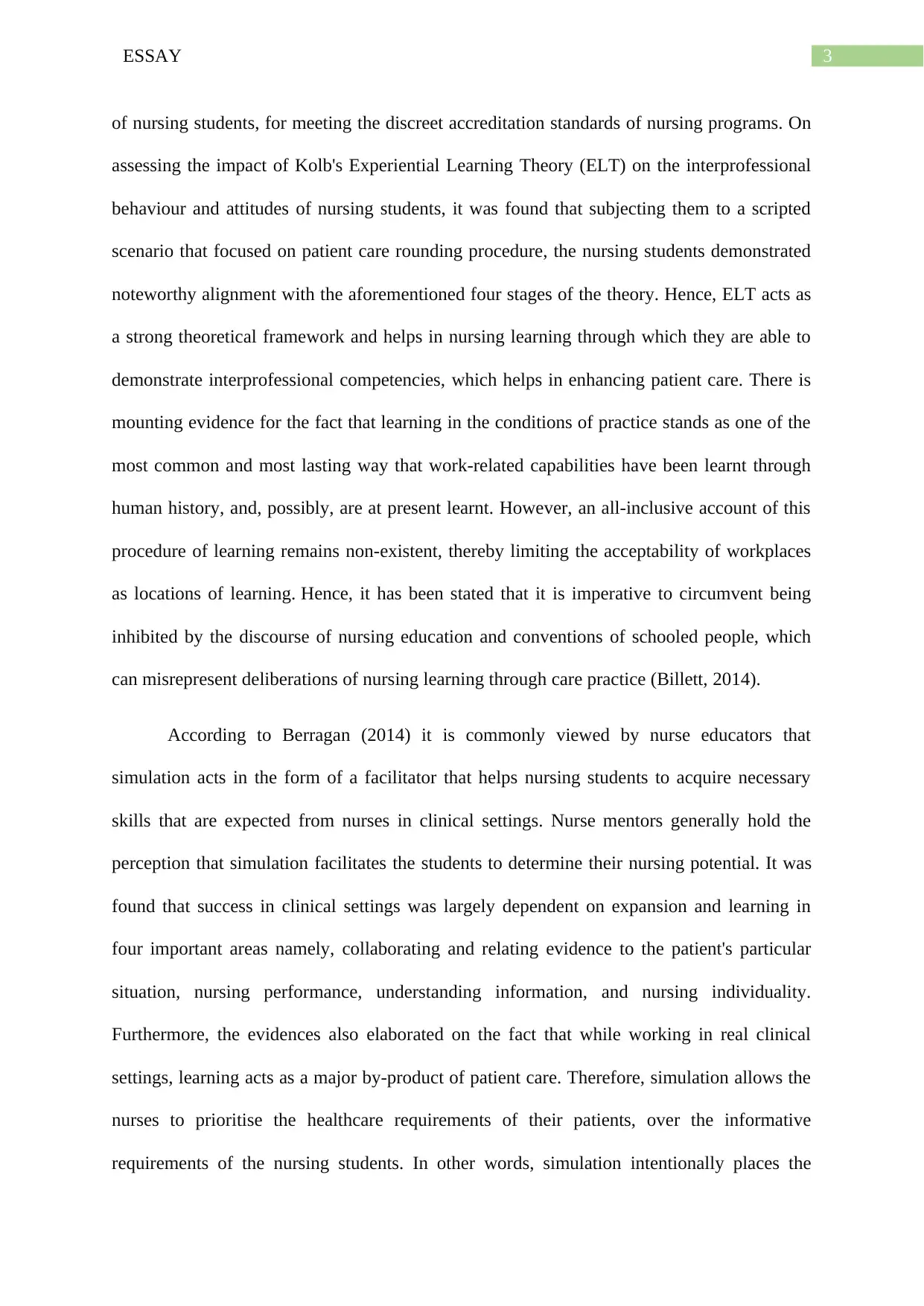
3ESSAY
of nursing students, for meeting the discreet accreditation standards of nursing programs. On
assessing the impact of Kolb's Experiential Learning Theory (ELT) on the interprofessional
behaviour and attitudes of nursing students, it was found that subjecting them to a scripted
scenario that focused on patient care rounding procedure, the nursing students demonstrated
noteworthy alignment with the aforementioned four stages of the theory. Hence, ELT acts as
a strong theoretical framework and helps in nursing learning through which they are able to
demonstrate interprofessional competencies, which helps in enhancing patient care. There is
mounting evidence for the fact that learning in the conditions of practice stands as one of the
most common and most lasting way that work-related capabilities have been learnt through
human history, and, possibly, are at present learnt. However, an all-inclusive account of this
procedure of learning remains non-existent, thereby limiting the acceptability of workplaces
as locations of learning. Hence, it has been stated that it is imperative to circumvent being
inhibited by the discourse of nursing education and conventions of schooled people, which
can misrepresent deliberations of nursing learning through care practice (Billett, 2014).
According to Berragan (2014) it is commonly viewed by nurse educators that
simulation acts in the form of a facilitator that helps nursing students to acquire necessary
skills that are expected from nurses in clinical settings. Nurse mentors generally hold the
perception that simulation facilitates the students to determine their nursing potential. It was
found that success in clinical settings was largely dependent on expansion and learning in
four important areas namely, collaborating and relating evidence to the patient's particular
situation, nursing performance, understanding information, and nursing individuality.
Furthermore, the evidences also elaborated on the fact that while working in real clinical
settings, learning acts as a major by-product of patient care. Therefore, simulation allows the
nurses to prioritise the healthcare requirements of their patients, over the informative
requirements of the nursing students. In other words, simulation intentionally places the
of nursing students, for meeting the discreet accreditation standards of nursing programs. On
assessing the impact of Kolb's Experiential Learning Theory (ELT) on the interprofessional
behaviour and attitudes of nursing students, it was found that subjecting them to a scripted
scenario that focused on patient care rounding procedure, the nursing students demonstrated
noteworthy alignment with the aforementioned four stages of the theory. Hence, ELT acts as
a strong theoretical framework and helps in nursing learning through which they are able to
demonstrate interprofessional competencies, which helps in enhancing patient care. There is
mounting evidence for the fact that learning in the conditions of practice stands as one of the
most common and most lasting way that work-related capabilities have been learnt through
human history, and, possibly, are at present learnt. However, an all-inclusive account of this
procedure of learning remains non-existent, thereby limiting the acceptability of workplaces
as locations of learning. Hence, it has been stated that it is imperative to circumvent being
inhibited by the discourse of nursing education and conventions of schooled people, which
can misrepresent deliberations of nursing learning through care practice (Billett, 2014).
According to Berragan (2014) it is commonly viewed by nurse educators that
simulation acts in the form of a facilitator that helps nursing students to acquire necessary
skills that are expected from nurses in clinical settings. Nurse mentors generally hold the
perception that simulation facilitates the students to determine their nursing potential. It was
found that success in clinical settings was largely dependent on expansion and learning in
four important areas namely, collaborating and relating evidence to the patient's particular
situation, nursing performance, understanding information, and nursing individuality.
Furthermore, the evidences also elaborated on the fact that while working in real clinical
settings, learning acts as a major by-product of patient care. Therefore, simulation allows the
nurses to prioritise the healthcare requirements of their patients, over the informative
requirements of the nursing students. In other words, simulation intentionally places the
Secure Best Marks with AI Grader
Need help grading? Try our AI Grader for instant feedback on your assignments.
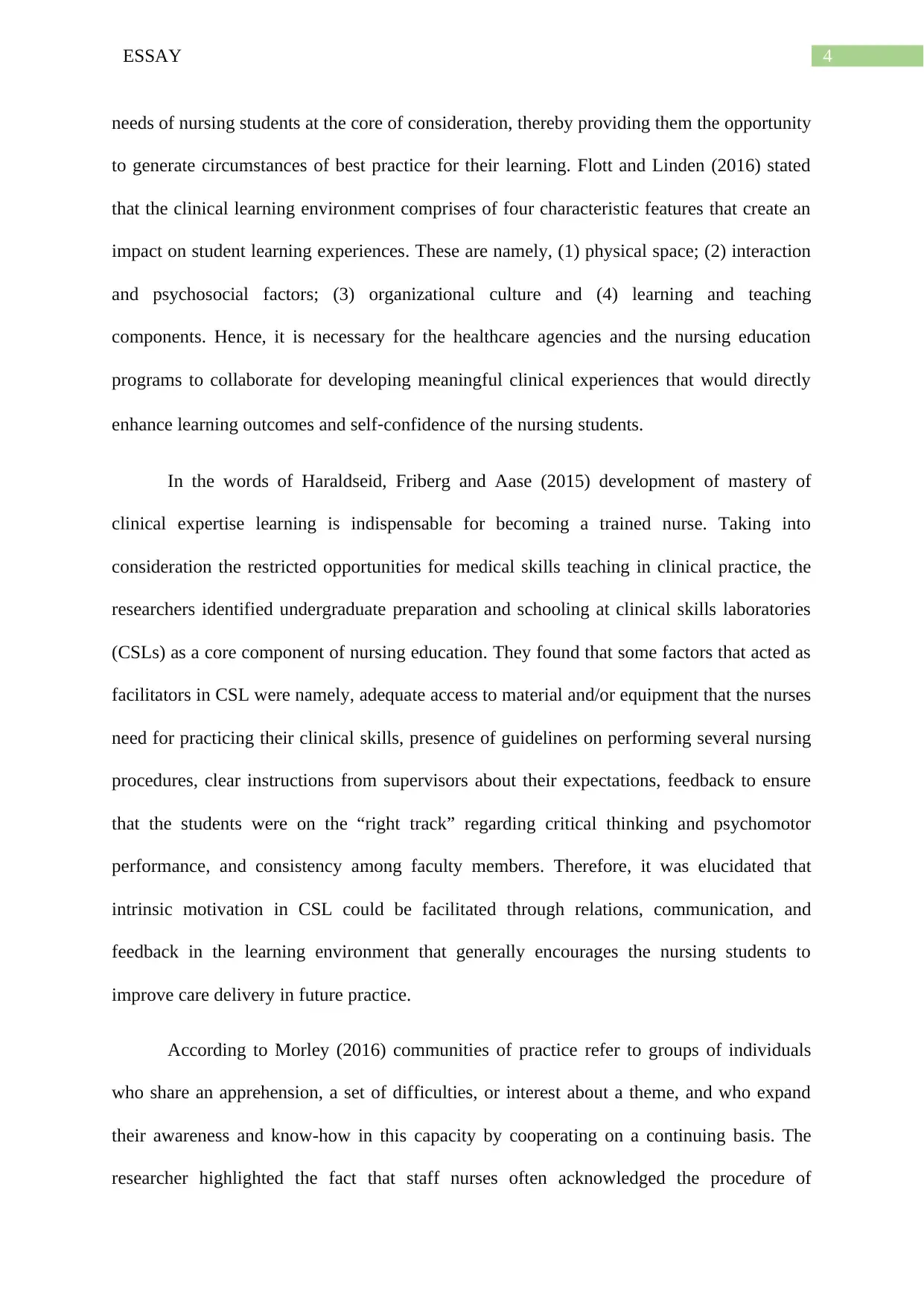
4ESSAY
needs of nursing students at the core of consideration, thereby providing them the opportunity
to generate circumstances of best practice for their learning. Flott and Linden (2016) stated
that the clinical learning environment comprises of four characteristic features that create an
impact on student learning experiences. These are namely, (1) physical space; (2) interaction
and psychosocial factors; (3) organizational culture and (4) learning and teaching
components. Hence, it is necessary for the healthcare agencies and the nursing education
programs to collaborate for developing meaningful clinical experiences that would directly
enhance learning outcomes and self‐confidence of the nursing students.
In the words of Haraldseid, Friberg and Aase (2015) development of mastery of
clinical expertise learning is indispensable for becoming a trained nurse. Taking into
consideration the restricted opportunities for medical skills teaching in clinical practice, the
researchers identified undergraduate preparation and schooling at clinical skills laboratories
(CSLs) as a core component of nursing education. They found that some factors that acted as
facilitators in CSL were namely, adequate access to material and/or equipment that the nurses
need for practicing their clinical skills, presence of guidelines on performing several nursing
procedures, clear instructions from supervisors about their expectations, feedback to ensure
that the students were on the “right track” regarding critical thinking and psychomotor
performance, and consistency among faculty members. Therefore, it was elucidated that
intrinsic motivation in CSL could be facilitated through relations, communication, and
feedback in the learning environment that generally encourages the nursing students to
improve care delivery in future practice.
According to Morley (2016) communities of practice refer to groups of individuals
who share an apprehension, a set of difficulties, or interest about a theme, and who expand
their awareness and know-how in this capacity by cooperating on a continuing basis. The
researcher highlighted the fact that staff nurses often acknowledged the procedure of
needs of nursing students at the core of consideration, thereby providing them the opportunity
to generate circumstances of best practice for their learning. Flott and Linden (2016) stated
that the clinical learning environment comprises of four characteristic features that create an
impact on student learning experiences. These are namely, (1) physical space; (2) interaction
and psychosocial factors; (3) organizational culture and (4) learning and teaching
components. Hence, it is necessary for the healthcare agencies and the nursing education
programs to collaborate for developing meaningful clinical experiences that would directly
enhance learning outcomes and self‐confidence of the nursing students.
In the words of Haraldseid, Friberg and Aase (2015) development of mastery of
clinical expertise learning is indispensable for becoming a trained nurse. Taking into
consideration the restricted opportunities for medical skills teaching in clinical practice, the
researchers identified undergraduate preparation and schooling at clinical skills laboratories
(CSLs) as a core component of nursing education. They found that some factors that acted as
facilitators in CSL were namely, adequate access to material and/or equipment that the nurses
need for practicing their clinical skills, presence of guidelines on performing several nursing
procedures, clear instructions from supervisors about their expectations, feedback to ensure
that the students were on the “right track” regarding critical thinking and psychomotor
performance, and consistency among faculty members. Therefore, it was elucidated that
intrinsic motivation in CSL could be facilitated through relations, communication, and
feedback in the learning environment that generally encourages the nursing students to
improve care delivery in future practice.
According to Morley (2016) communities of practice refer to groups of individuals
who share an apprehension, a set of difficulties, or interest about a theme, and who expand
their awareness and know-how in this capacity by cooperating on a continuing basis. The
researcher highlighted the fact that staff nurses often acknowledged the procedure of
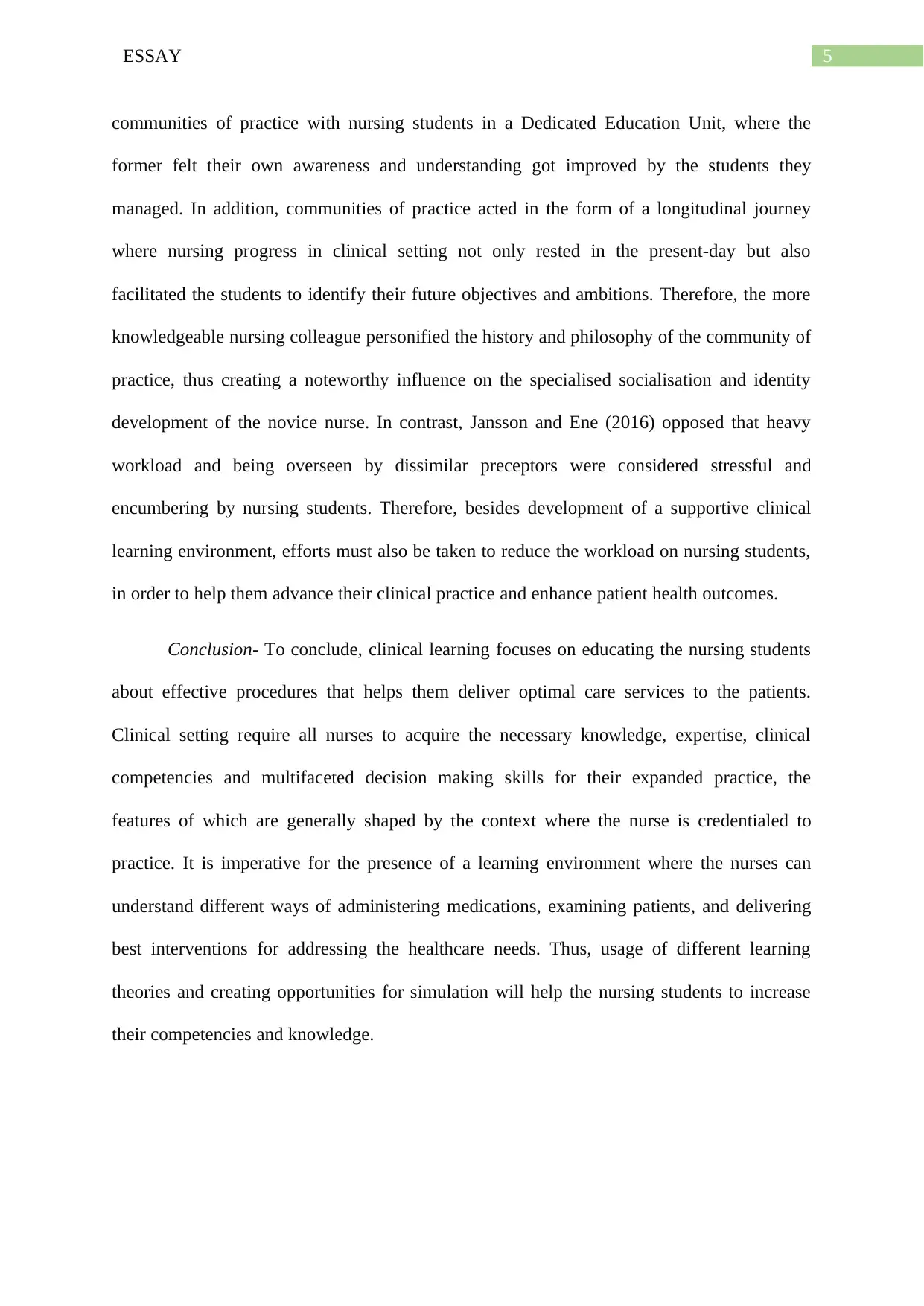
5ESSAY
communities of practice with nursing students in a Dedicated Education Unit, where the
former felt their own awareness and understanding got improved by the students they
managed. In addition, communities of practice acted in the form of a longitudinal journey
where nursing progress in clinical setting not only rested in the present-day but also
facilitated the students to identify their future objectives and ambitions. Therefore, the more
knowledgeable nursing colleague personified the history and philosophy of the community of
practice, thus creating a noteworthy influence on the specialised socialisation and identity
development of the novice nurse. In contrast, Jansson and Ene (2016) opposed that heavy
workload and being overseen by dissimilar preceptors were considered stressful and
encumbering by nursing students. Therefore, besides development of a supportive clinical
learning environment, efforts must also be taken to reduce the workload on nursing students,
in order to help them advance their clinical practice and enhance patient health outcomes.
Conclusion- To conclude, clinical learning focuses on educating the nursing students
about effective procedures that helps them deliver optimal care services to the patients.
Clinical setting require all nurses to acquire the necessary knowledge, expertise, clinical
competencies and multifaceted decision making skills for their expanded practice, the
features of which are generally shaped by the context where the nurse is credentialed to
practice. It is imperative for the presence of a learning environment where the nurses can
understand different ways of administering medications, examining patients, and delivering
best interventions for addressing the healthcare needs. Thus, usage of different learning
theories and creating opportunities for simulation will help the nursing students to increase
their competencies and knowledge.
communities of practice with nursing students in a Dedicated Education Unit, where the
former felt their own awareness and understanding got improved by the students they
managed. In addition, communities of practice acted in the form of a longitudinal journey
where nursing progress in clinical setting not only rested in the present-day but also
facilitated the students to identify their future objectives and ambitions. Therefore, the more
knowledgeable nursing colleague personified the history and philosophy of the community of
practice, thus creating a noteworthy influence on the specialised socialisation and identity
development of the novice nurse. In contrast, Jansson and Ene (2016) opposed that heavy
workload and being overseen by dissimilar preceptors were considered stressful and
encumbering by nursing students. Therefore, besides development of a supportive clinical
learning environment, efforts must also be taken to reduce the workload on nursing students,
in order to help them advance their clinical practice and enhance patient health outcomes.
Conclusion- To conclude, clinical learning focuses on educating the nursing students
about effective procedures that helps them deliver optimal care services to the patients.
Clinical setting require all nurses to acquire the necessary knowledge, expertise, clinical
competencies and multifaceted decision making skills for their expanded practice, the
features of which are generally shaped by the context where the nurse is credentialed to
practice. It is imperative for the presence of a learning environment where the nurses can
understand different ways of administering medications, examining patients, and delivering
best interventions for addressing the healthcare needs. Thus, usage of different learning
theories and creating opportunities for simulation will help the nursing students to increase
their competencies and knowledge.
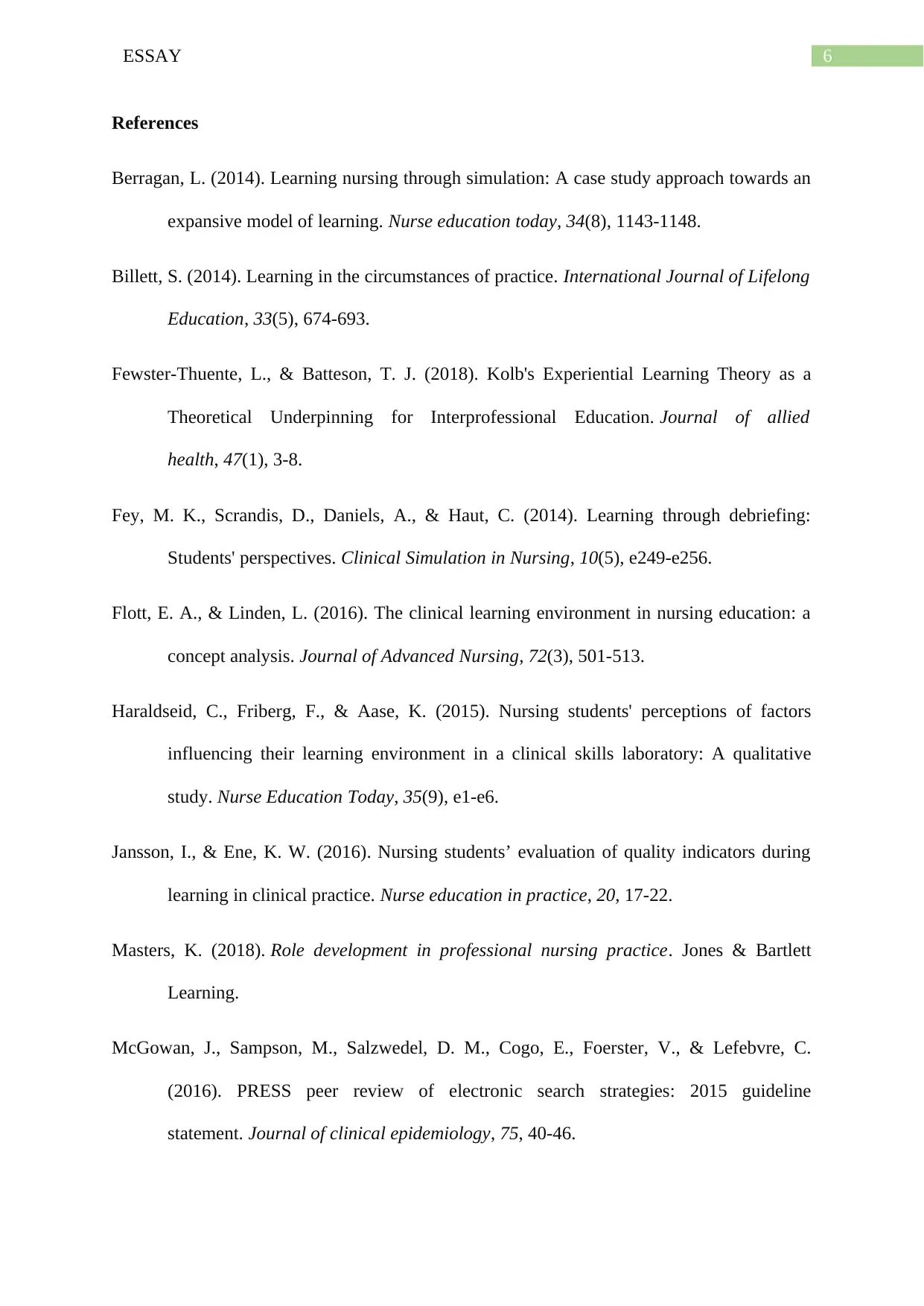
6ESSAY
References
Berragan, L. (2014). Learning nursing through simulation: A case study approach towards an
expansive model of learning. Nurse education today, 34(8), 1143-1148.
Billett, S. (2014). Learning in the circumstances of practice. International Journal of Lifelong
Education, 33(5), 674-693.
Fewster-Thuente, L., & Batteson, T. J. (2018). Kolb's Experiential Learning Theory as a
Theoretical Underpinning for Interprofessional Education. Journal of allied
health, 47(1), 3-8.
Fey, M. K., Scrandis, D., Daniels, A., & Haut, C. (2014). Learning through debriefing:
Students' perspectives. Clinical Simulation in Nursing, 10(5), e249-e256.
Flott, E. A., & Linden, L. (2016). The clinical learning environment in nursing education: a
concept analysis. Journal of Advanced Nursing, 72(3), 501-513.
Haraldseid, C., Friberg, F., & Aase, K. (2015). Nursing students' perceptions of factors
influencing their learning environment in a clinical skills laboratory: A qualitative
study. Nurse Education Today, 35(9), e1-e6.
Jansson, I., & Ene, K. W. (2016). Nursing students’ evaluation of quality indicators during
learning in clinical practice. Nurse education in practice, 20, 17-22.
Masters, K. (2018). Role development in professional nursing practice. Jones & Bartlett
Learning.
McGowan, J., Sampson, M., Salzwedel, D. M., Cogo, E., Foerster, V., & Lefebvre, C.
(2016). PRESS peer review of electronic search strategies: 2015 guideline
statement. Journal of clinical epidemiology, 75, 40-46.
References
Berragan, L. (2014). Learning nursing through simulation: A case study approach towards an
expansive model of learning. Nurse education today, 34(8), 1143-1148.
Billett, S. (2014). Learning in the circumstances of practice. International Journal of Lifelong
Education, 33(5), 674-693.
Fewster-Thuente, L., & Batteson, T. J. (2018). Kolb's Experiential Learning Theory as a
Theoretical Underpinning for Interprofessional Education. Journal of allied
health, 47(1), 3-8.
Fey, M. K., Scrandis, D., Daniels, A., & Haut, C. (2014). Learning through debriefing:
Students' perspectives. Clinical Simulation in Nursing, 10(5), e249-e256.
Flott, E. A., & Linden, L. (2016). The clinical learning environment in nursing education: a
concept analysis. Journal of Advanced Nursing, 72(3), 501-513.
Haraldseid, C., Friberg, F., & Aase, K. (2015). Nursing students' perceptions of factors
influencing their learning environment in a clinical skills laboratory: A qualitative
study. Nurse Education Today, 35(9), e1-e6.
Jansson, I., & Ene, K. W. (2016). Nursing students’ evaluation of quality indicators during
learning in clinical practice. Nurse education in practice, 20, 17-22.
Masters, K. (2018). Role development in professional nursing practice. Jones & Bartlett
Learning.
McGowan, J., Sampson, M., Salzwedel, D. M., Cogo, E., Foerster, V., & Lefebvre, C.
(2016). PRESS peer review of electronic search strategies: 2015 guideline
statement. Journal of clinical epidemiology, 75, 40-46.
Paraphrase This Document
Need a fresh take? Get an instant paraphrase of this document with our AI Paraphraser
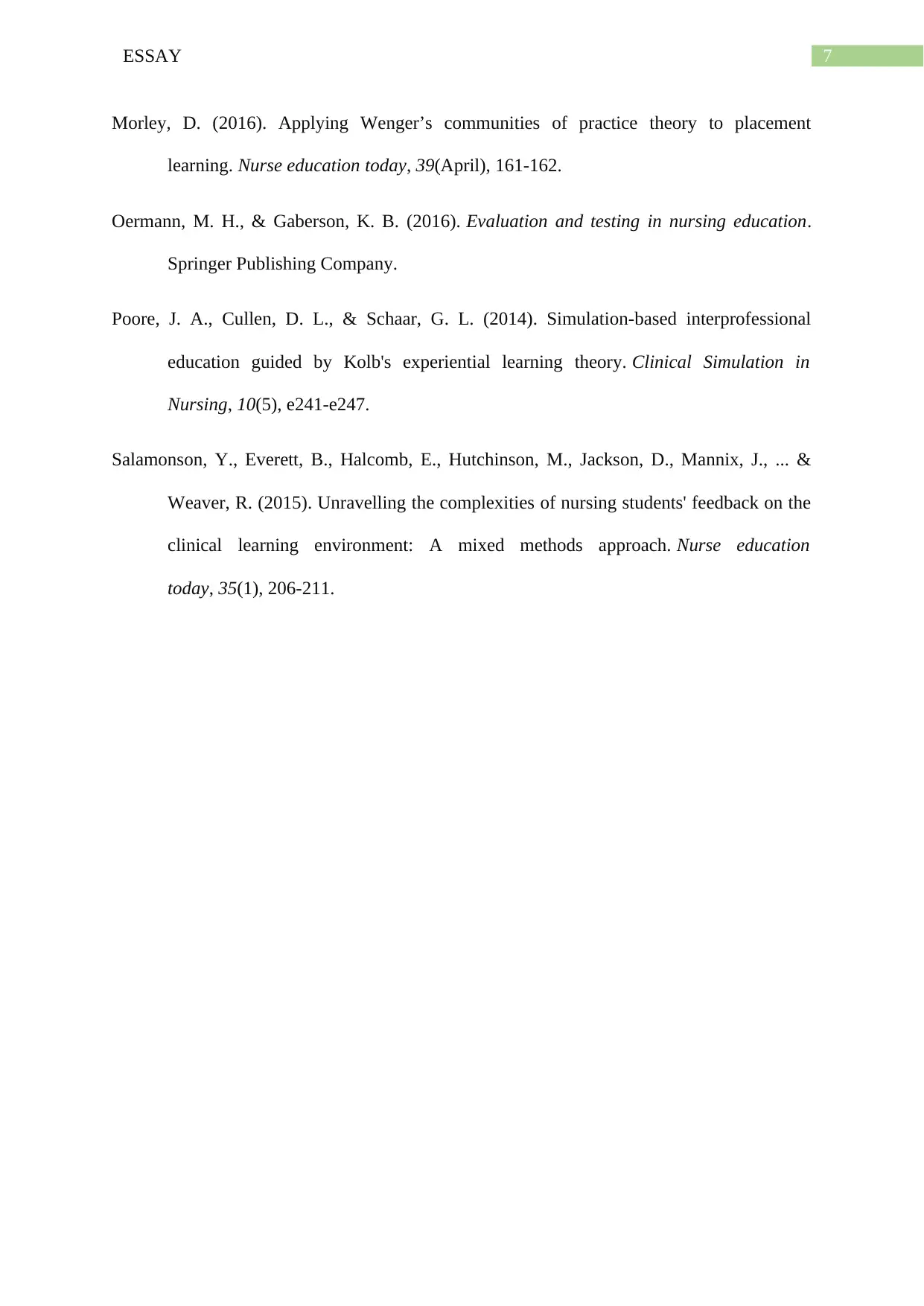
7ESSAY
Morley, D. (2016). Applying Wenger’s communities of practice theory to placement
learning. Nurse education today, 39(April), 161-162.
Oermann, M. H., & Gaberson, K. B. (2016). Evaluation and testing in nursing education.
Springer Publishing Company.
Poore, J. A., Cullen, D. L., & Schaar, G. L. (2014). Simulation-based interprofessional
education guided by Kolb's experiential learning theory. Clinical Simulation in
Nursing, 10(5), e241-e247.
Salamonson, Y., Everett, B., Halcomb, E., Hutchinson, M., Jackson, D., Mannix, J., ... &
Weaver, R. (2015). Unravelling the complexities of nursing students' feedback on the
clinical learning environment: A mixed methods approach. Nurse education
today, 35(1), 206-211.
Morley, D. (2016). Applying Wenger’s communities of practice theory to placement
learning. Nurse education today, 39(April), 161-162.
Oermann, M. H., & Gaberson, K. B. (2016). Evaluation and testing in nursing education.
Springer Publishing Company.
Poore, J. A., Cullen, D. L., & Schaar, G. L. (2014). Simulation-based interprofessional
education guided by Kolb's experiential learning theory. Clinical Simulation in
Nursing, 10(5), e241-e247.
Salamonson, Y., Everett, B., Halcomb, E., Hutchinson, M., Jackson, D., Mannix, J., ... &
Weaver, R. (2015). Unravelling the complexities of nursing students' feedback on the
clinical learning environment: A mixed methods approach. Nurse education
today, 35(1), 206-211.
1 out of 8
Related Documents
Your All-in-One AI-Powered Toolkit for Academic Success.
+13062052269
info@desklib.com
Available 24*7 on WhatsApp / Email
![[object Object]](/_next/static/media/star-bottom.7253800d.svg)
Unlock your academic potential
© 2024 | Zucol Services PVT LTD | All rights reserved.





